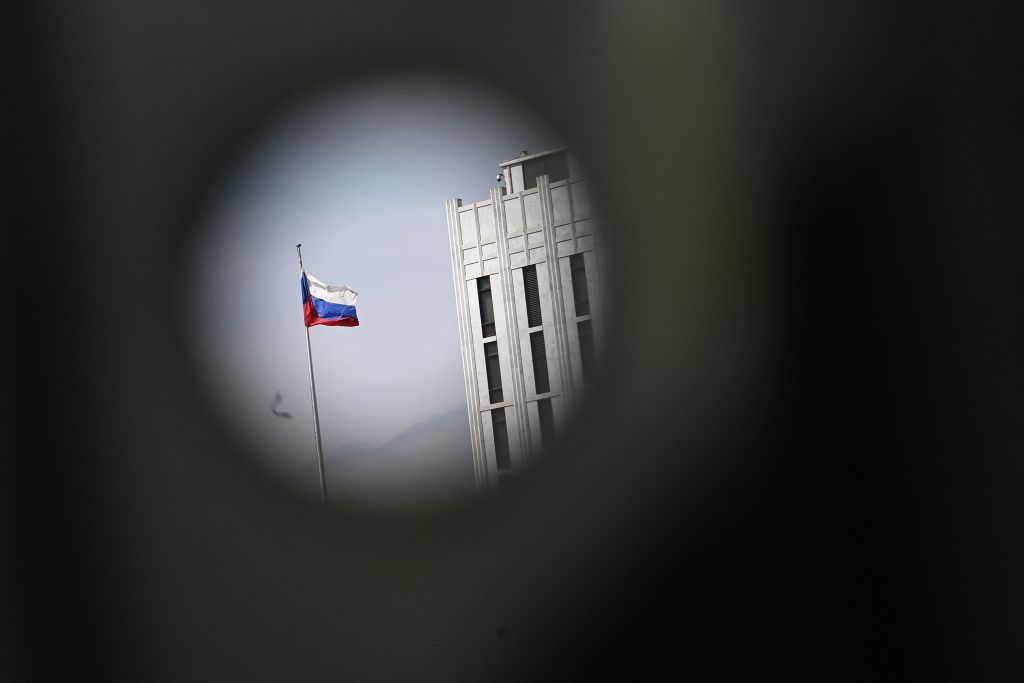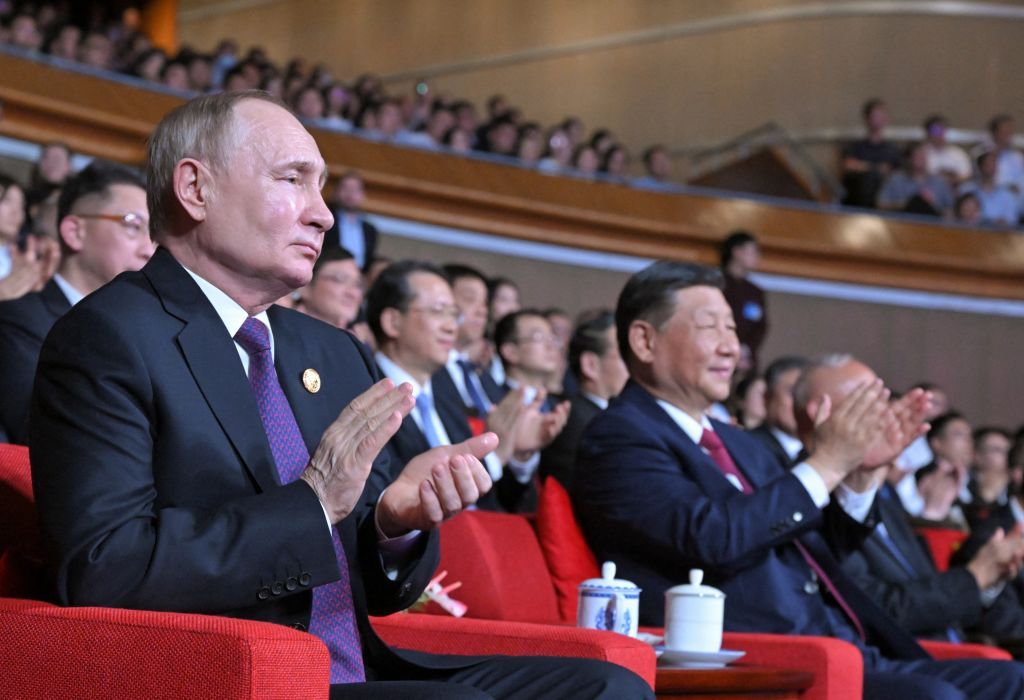Opinion: Navigating the ‘Zelensky Legitimacy Question’
As Zelensky’s presidential term comes to an end, debates over his legitimacy and Ukraine’s political future intensify.

Ukrainian President Volodymyr Zelensky waves to a crowd in front of the Danish parliament in Copenhagen, Denmark, on Aug. 21, 2023. (Mads Claus Rasmussen/Ritzau Scanpix/AFP via Getty Images)

Jakub Parusinski
Volodymyr Zelensky’s five-year term as Ukraine’s president expired on May 20. For most Ukrainian citizens, including the country’s constitutionalists, the path forward is clear: Zelensky should continue as president until martial law in Ukraine ends and new elections can take place.
But critics argue that Zelensky and his decisions from May 20 onward will essentially be illegitimate. This has raised concerns about potential protests in Ukraine against Zelensky’s tenure, including offbeat Russian propaganda narratives about a “Maidan 3.0.” More concerning is that this narrative will likely be used to tarnish the legitimacy of Ukraine’s peace and ceasefire talks and be used by Russia to achieve concessions.
Opposition to the continuation of Zelensky’s term has not had much traction within Ukraine or among the country’s allies. Most in the West understand that legitimate elections cannot be held given the challenges that would prevent Ukrainians from fully participating in the democratic process, including near-constant bombardment, the threat of cyber attacks, Russian occupation of Ukrainian territory, limited campaigning opportunities, and the millions of Ukrainians who are refugees, internally displaced, or serving in the military.
However, claims put out by Russia and its allies’ propaganda machines aim to discredit Zelensky internationally, particularly in the so-called Global South. Ukrainian authorities will have yet another problem to manage if these narratives gain traction.
Constitutional ambiguity
Unlike the clear guidelines set for the parliament (Verkhovna Rada), Ukraine’s Constitution leaves some gray areas regarding how presidential terms are handled during martial law.
While the document sets a five-year term for the president, it also includes a mechanism to ensure the continuity of power, thus preventing a dangerous power vacuum situation. Article 108 ensures that the president’s powers remain intact until a new president is inaugurated, while Article 112 outlines the Speaker of the Verkhovna Rada as the interim head if presidential powers terminate prematurely.
Martial law, extended 11 times since Russia’s full-scale invasion, adds another layer of complexity. As per the Law on the Legal Regime of Martial Law signed by then-President Petro Poroshenko in 2015, presidential powers cannot be terminated during these periods.
Ukraine’s Central Election Commission (CEC) reinforced this interpretation in March 2024, asserting that elections cannot be held under martial law and Zelensky must remain in office until a new president is elected after martial law ends.
Most Ukrainian legal experts, including Andrii Mahera, Oleksandr Moskaliuk, Stanislav Shevchuk, and Yulia Kyrychenko, agree that the principle of continuity of state power supports Zelensky’s ongoing legitimacy. Historical precedents, such as the presidential terms of Leonid Kuchma and Viktor Yushchenko, which exceeded five years, strengthen this interpretation.
There has been discussion about whether Ukraine’s Constitutional Court, tasked with arbitrating such disputes, could provide a definitive resolution. However, the Court’s capacity to do so is hindered by vacancies and politicization. Consequently, it’s uncertain how a Constitutional Court interpretation would unfold.
While 10 judges are sufficient to issue a binding decision, five of the 18 seats are vacant. Of the remaining 13, four were directly nominated by Poroshenko, one by the previous Verkhovna Rada, and four by two judicial conventions (each comprising six slots that can be filled by the president, parliament, and judicial conventions).
A minor yet significant change is anticipated on May 29, as the acting chair is set to retire upon reaching the mandatory age of 70. Zelensky has the authority to appoint a successor, sparking speculation about Verkhovna Rada Chairman Ruslan Stefanchuk assuming the role. Discussions have started in the Verkhovna Rada to potentially appoint Yurii Barabash, Oleksandr Vodiannikov, and Serhii Riznyk as Constitutional Court judges.

Political impasse
A minimum of 10% of the Verkhovna Rada’s deputies can appeal to the Constitutional Court, but both the government and the opposition are reluctant to seek a definitive ruling.
Zelensky’s camp, wary of feeding into Russian propaganda narratives, has chosen to ignore the issue entirely, relying instead on the CEC’s interpretation as a stopgap. In contrast, the opposition holds a strategic advantage in perpetuating the ambiguity, using it to sow doubt and undermine the legitimacy of the current administration.
The international arrest warrant issued in 2022 against the former Constitutional Court head Oleksandr Tupytskyi for corruption also stokes each side’s fear of the other’s influence in court.
The opposition’s efforts to contest Zelensky’s legitimacy have not gathered significant momentum. An emerging anti-Zelensky coalition, which includes prominent figures like Poroshenko, former Prime Minister Yulia Tymoshenko, and former Verkhovna Rada Chairman Dmytro Razumkov, has struggled to mobilize sufficient public and parliamentary backing.
This anti-Zelensky coalition crystallized after the vote on the contentious mobilization bill in April, although it comprises just over 100 deputies at most, significantly short of the 226 needed for a majority. The vote, narrowly won by Zelensky, demonstrated his ability to retain a fragile grip on the Verkhovna Rada. Nonetheless, according to party members hesitant to speak publicly, this victory required significant personalized outreach to individual deputies and strategic alliances with opposition parties.
The situation remains fragile, with party discipline within Zelensky’s Servant of the People faction deteriorating. For instance, dozens of Servant of the People MPs have contemplated resignation, risking parliamentary paralysis. It’s worth noting that the parliament has 49 positions vacant out of 450, and this number will continue to rise, primarily due to natural reasons, in the absence of elections.
Overlooked complexities
Western analyses often fail to grasp the nuanced dynamics of Ukrainian politics. Ukraine’s political landscape is uniquely volatile, marked by two major revolutions in the span of two decades. We believe Zelensky is acutely aware of this context and of the fact that legitimacy hinges not only on legality but also on public acceptance of authority.
Zelensky has little cause for concern for the time being. According to the latest polls, a decisive majority of Ukrainians (63%) express trust in Zelensky’s presidency and believe he should continue his duties until martial law ends. Many of Zelensky’s opponents prefer that he stay in power, presumably extending his presidency by a few months, rather than hold another election and risk granting him another five years.
As Kyiv Independent Editor-in-Chief Olga Rudenko put it, “People are watching the administration’s actions, not the calendar.” However, internal politics must not be overlooked when seeking ways to de-escalate the war. The current administration will undoubtedly play a crucial role in any potential ceasefire negotiations. Nevertheless, regardless of their form and outcome, these negotiations are expected to face significant opposition from a considerable portion of the population.
Historical comparisons, like the Korean armistice, underscore the necessity of comprehensive political and economic assurances to secure a lasting peace. At the time, then-Korean President Syngman Rhee agreed to a ceasefire only after securing significant guarantees from the U.S. Similarly, Zelensky must obtain robust assurances to navigate post-war war governance effectively.
In the event of actual ceasefire negotiations, Russia and its proxies will try to leverage legitimacy concerns, effectively using them as another bargaining chip. Arguably more important is securing a deal that is sufficiently acceptable to mitigate domestic challenges, especially given the devastating toll of the ongoing two-and-a-half years of full-scale war.
De-escalation requires significant political and economic investments in addition to military efforts. The international community needs to recognize the gravity of the situation and be ready to commit to a sustainable resolution, providing guarantees on a scale comparable to those seen in previous conflicts.
Editor’s Note: The opinions expressed in the op-ed section are those of the authors and do not purport to reflect the views of the Kyiv Independent.












